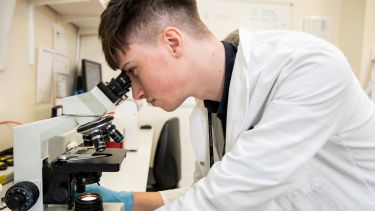Intercalated BSc Medical Sciences Research
Our intercalated BSc in Medical Sciences Research course gives students a thorough grounding and understanding of research skills, ethical research practice, and applied statistics in two core taught modules, and a research project, followed by a choice of modules.

About the degree
The BSc Medical Sciences Research degree is an incredible opportunity to gain experience in a research environment, undertaking clinical or surgical based research, lab/bench projects, research in medical humanities of qualitative research.
Compulsory modules
The course comprises three compulsory modules
Ethical Research Practice
This module will cover fundamental ethical concepts in research and writing. The module aims to give you an understanding of the core concepts of ethical theory, and applied ethical principles in the field of clinical, health and health related research. The module will also cover ethical considerations in scientific writing, including the effect of AI on research and writing, scientific fraud and the media portrayal of science, assessed by a group presentation and a written assignment.
Research Skills
This module will give an introduction to key data generation & analysis methods relevant to the field of medical research and will enable you to develop critical appraisal skills. As part of the data analysis the module will give you an understanding of fundamental statistical methods and more widely used advanced methods of multiple linear regression and survival analysis. It will train you in the use of statistical software and equip you with the knowledge and skills necessary to analyse a study and present findings in a suitable fashion, and is assessed by two written assignments
Intercalated Research Project
Students will complete a six month original research project, self-directed with the support of a supervisor and assessed by a dissertation and an oral presentation. The projects are offered in disciplines including oncology, cardiovascular sciences, infection, immunity, neuroscience, child health, endocrinology, reproductive medicine and surgery. They are categorised into clinical/surgical, lab, medical humanities or qualitative projects.
Optional modules
There are two optional modules and students will do the one that is most suited to the research project they have chosen:
Understanding Medical Research Practice
This module aims to provide you with a comprehensive understanding of quantitative and qualitative research methods; it covers all stages of the research process from planning and design, public and patient involvement (PPI), through to data collection and analysis. You will develop their understanding of both quantitative and qualitative research methodologies within the context of health-related research such as clinical trials. You will gain first hand experience of medical research through time spent in the Clinical Research Facility. This is for students who have not chosen a surgery project. This is assessed by an oral presentation and a written assignment.
Understanding Surgical and Anaesthetic Practice
This module will explore the crucial role of research in advancing surgical and anaesthetic knowledge and practice. Through tutorials, you'll learn how research informs the surgical pathway for treating disease. You'll also get to develop basic theatre skills and gain hands-on experience through clinical attachments in a variety of surgical specialties. This module will provide a solid foundation in both the theoretical and practical aspects of surgery, anaesthetics, or related specialties. This is for students who have chosen a surgery or anaesthetics based project. This is assessed by an oral presentation and a written portfolio.
Benefits of an intercalated BSc degree
The intercalated BSc is an incredible opportunity to gain experience in a research environment, either Clinical Research, Lab/Bench Projects, research in medical humanities or qualitative research. Past students have found that having this experience has opened up more opportunities to them, whilst improving various transferable skills.
Expand your academic skills
- Design a research project in accordance with appropriate research methodologies and ethical principles
- Exercise independent judgement and critical thinking
- Apply basic statistical methods to data evaluation and interpretation
- Present work orally and in writing to an academic audience
- Where your own project requires it, carry out practical experiments and tasks in a laboratory setting in accordance with health and safety guidelines
- Produce a well-structured and substantial dissertation to present the results of their research project
- Conduct an extensive literature review using relevant sources
Develop your transferable skills
- Apply good time-management skills to structure their work and meet deadlines
- Effectively use a wide range of IT packages for a variety of tasks
- Work independently on a project
- Display good written and oral communication skills
- Understand and apply basic statistical methods
- Self-direct your learning
Enhance your career
- Spend a year doing a high-quality research project
- Improve your CV
- Take the first step in a career in academic medicine
- Gain a better knowledge of one medical speciality
- Work closely with leading and internationally renown research academics and consultant staff
- Gain skills in oral presentations, poster writing and writing for publications.
- Present papers and posters at major international conferences and to get work published
Attend conferences
Students have had the opportunity to go to different conferences both in the UK and abroad, including the British Sarcoma Conference, the College of Emergency Medicine's Annual Conference, Twickenham, the European Network for the Cure of ALS Conference, the International Conference on Children's Bone Health in Rotterdam, and the Royal College of Psychiatry International Congress in Edinburgh.
Publish your work
Many of our students are given the opportunity to publish their work either by having a published abstract at an academic conference, or by writing up their work for a peer reviewed journal.
Win prizes
The Intercalated BSc Medical Sciences Research Prize is awarded to the best performing student on the intercalated BSc Medical Sciences Research course based on the overall final mark. The Examination board will make the recommendation as to the award of the prize.

